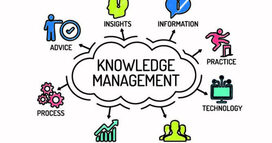
When a customer calls, contact center agents rely heavily on knowledge base to answer customer questions. Not having knowledge management in place can jeopardize the quality of customer service in a contact center.
The biggest hurdles to providing high quality customer service is lack of contact center knowledge and inconsistency of answers across different channels of contact as well as inability of self-service help center to deliver information needed by customers. The solution to these hurdles is is the unified multiple channels knowledge management.
These are the main reasons why knowledge management is crucial component in service organizations:
1. Multiple Contact Channels – customers contact with organizations using multiple channels. It is very important to provide a single source of the truth, so that contact center
employees can provide consistent answers to customer questions across phone, email, chat, SMS, and social media. Having a central knowledge base accessible across channels
eliminates silos of information that can lead to different answers for the same question.
2. Self-Service – majority of customers prefer to find answers to questions on their own. Since there is no employee involved in this process to provide answers, an easy-to-navigate knowledge base is essential to give customers a place to search for answers on their computers or mobile devices. This can also service customers while employees are on holidays break, sick days, etc. Self-service also deflects need for customers calls, chat and emails.
3. Issue Complexity – one side effect of the popularity of self-service is that the issues that do arrive in the contact center can be the most difficult and complex. Because of this, agents are unlikely to know the answers and will rely heavily on a knowledge base to find information. A good knowledge base which contains information across a wide variety of topics would be very helpful.
Even if an agent has never taken a certain type of call, he/she can resolve the issue with confidence having such knowledge base handy. Ability to answer complex customers' questions would reduce the rate of return due to inability of agents to answer customers' questions and solve their problems.
4. Trusted Content – social content from forums and online communities can be a plentiful source of useful information, but customers can never be sure if the information is accurate. By promoting social content as part of a structured knowledge base, you can ensure that customers trust that the information is accurate and up to date.
5. Tools and Tactics – the tools and tactics to make contact center workforce successful must also evolve. Contact center workforce should be able to look up information rather than memorizing, and they usually rely heavily on a knowledge base to find answers for customers.
6. Pace of Change – when issues arise, up-to-date information is paramount. Weather issues, communication outages and software bugs can all generate an influx of calls demanding answers with the very latest information. A knowledge base gives employees a place to find the most current information on a frequently changing situation.
7. Speed of Answer – everyone is looking for shorter handling time. Customers are happy to get answers quickly, and organizations get the cost savings they require. However,
shorter handling times are only valuable when the call is still resolved with complete, accurate information. A knowledge base provides a quick way to get reliable answers to even the most complex questions.
8. Any Agent, Any Call – specialized agents can cause frustration and inefficiency as customers get transferred from employee to employee to get an answer. When each agent can access the full breadth of information in a central knowledge base, there is less need to specialize agents for tier one calls. Transfers can be reduced, resulting in happier customers and a more efficient contact center.
9. Employees Engagement – it is important to provide the tools for employees to feel engaged, do their jobs well, and feel confident and motivated in their work. A comprehensive knowledge base is a very useful tool that empowers employees and enables them to answer a broad range of customer questions, even on topics they may not have encountered before.
10. Employees Turnover – employees turnover can be extremely costly. Each time a new employee is on-boarded, weeks of time are spent training him/her on the vast array of information required to help customers. A knowledge base that contains the information needed to answer customer questions can significantly reduce training time, allowing trainers to focus on soft skills and customer engagement.
11. Employees Training - you can reduce employees training needs without compromising service quality by having an optimal knowledge base in place. You can also reduce employees training time which in turn cuts the time lost due to training time.
Providing high level of customer service is not easy, but with a successful knowledge management, you can empower your customers and employees with the information they need, when they need it. Since customer service issues will only grow in both number and complexity, now is the time to ensure your customer service operation is equipped with a knowledge management system. Done right, knowledge management can transform contact centers.
Galaxy Consulting has over 18 years experience in knowledge management. Please contact us today for a free consultation.
 RSS Feed
RSS Feed
